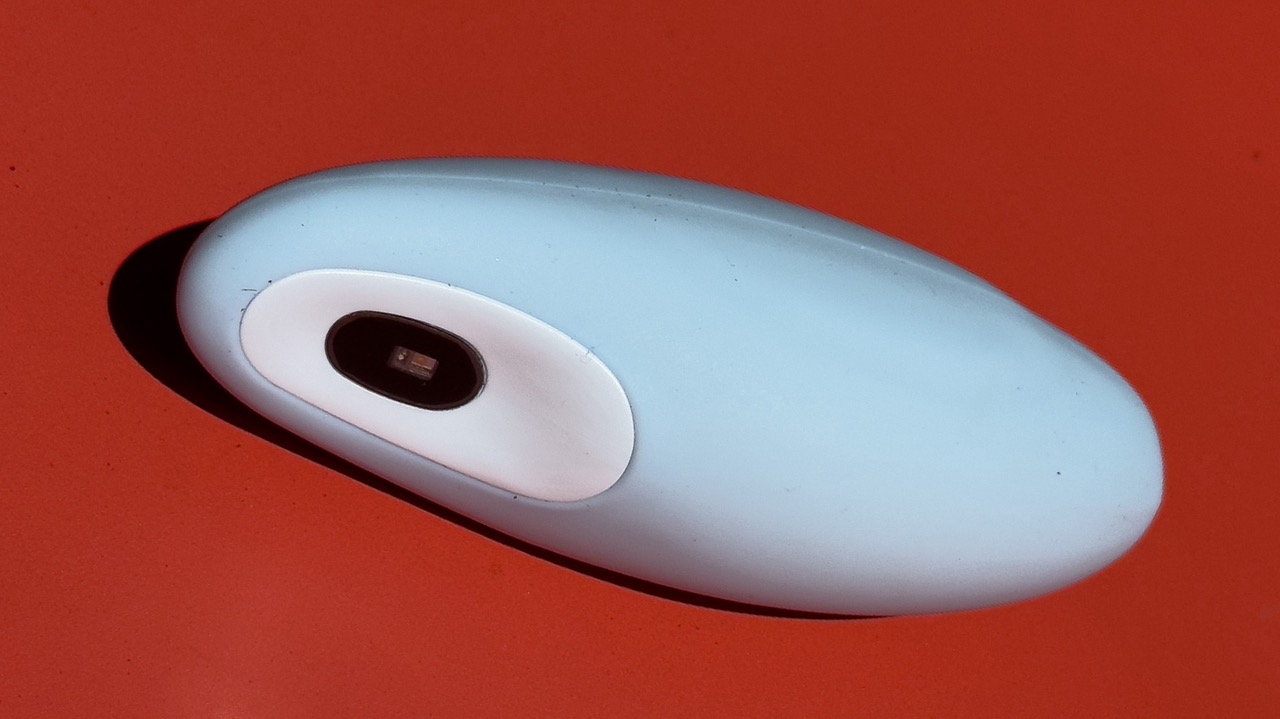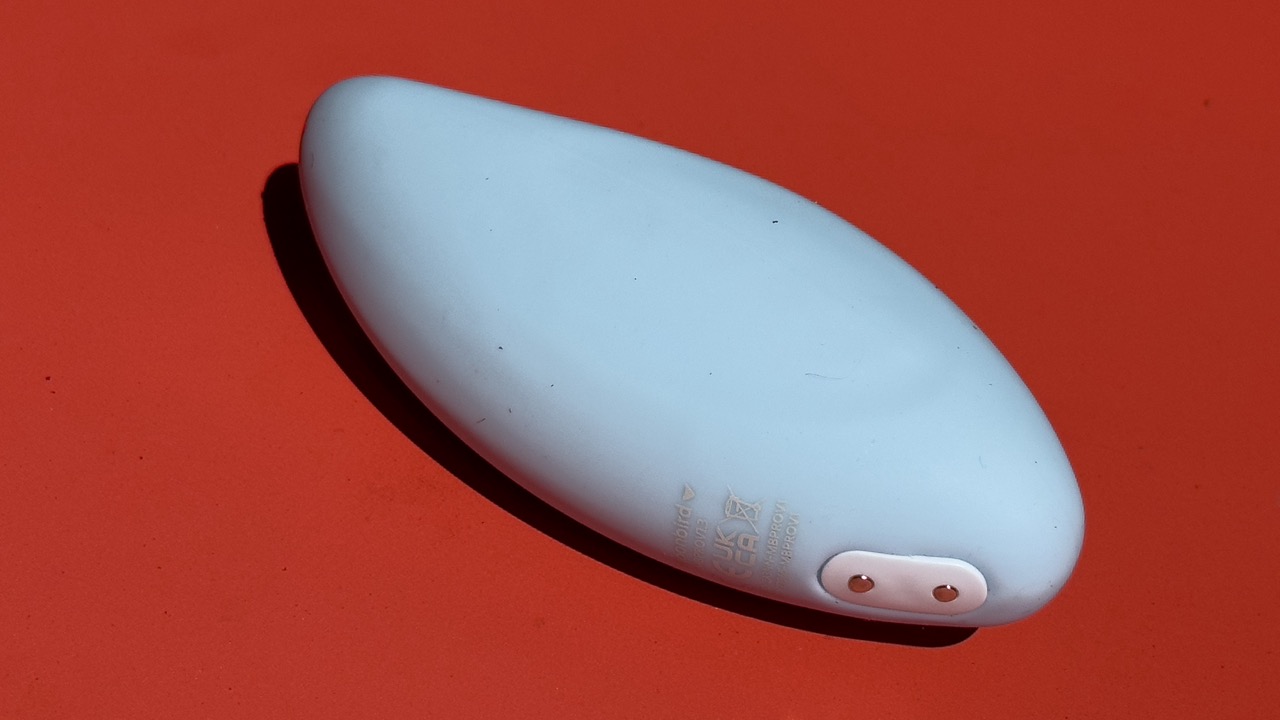“Well it looks like you had some fun recently,” a friend said as he joined me for coffee. There, in the middle of my dining room table, is a device that does, now that he mentions it, look an awful lot like a sex toy. Moonbird‘s raison d’etre isn’t to raise your pulse and get you breathing heavily. Quite the opposite, in fact. The Belgian company has helped more than 35,000 customers find sleep and reduce stress through breathing exercises.
The bird-looking device is super simple to use: Give it a shake, place your thumb on the sensor and the palm-sized device starts whirring gently as it expands in size, then shrinks back down. Use the “breathing” plastic bird to pace your own breathing, and your body gets tricked into thinking that everything is copacetic in the world. It really seems like it shouldn’t work, but it does. Science agrees; “Slow breathing can be used as an alternate, non-pharmacological therapy for hypertension individuals to reduce blood pressure,” concludes a paper published in Frontiers in Psychology. Harvard Medical School suggests it’s good for stress. And from personal experience, I’ve woken up holding the little nugget of plastic more than once in the week I’ve tried it out.
How it works
Whenever I evaluate a tech product, I wonder “does this really need to exist?” — especially given that there seem to be more than 2,500 meditation apps available, and at least a couple of dozen breathwork or breathing-specific apps. Manufacturing more chunks of plastic that will inevitably end up in the trash — is that a good idea? The company’s founders make a compelling case for their existence.
“There are obviously a lot of apps that you can use, that can give you support. But if you’re struggling with sleeping problems, the last thing you want to do is grab your phone and open a meditation app,” says Stefanie Broes, founder and CEO at Moonbird, in an interview with TechCrunch. She declares the phone the enemy of sleep. “You’ll be scrolling and doing other stuff. For me, it was really important that we develop a non-connected, non-app solution that guides you to pace your breathing. By breathing at a rate that’s scientifically proven that it relaxes your nervous system, it will calm you down. We had the idea of developing a device — a physical thing — that helps by breathing with you. So you don’t need to listen or look at an app, but a physical object that moves for you in an organic way.”
Stefanie was experiencing insomnia during her PhD, and her quest for a solution led her to breathwork, which amazed her with its benefits. In the process, she noticed a gap in the market. Stefanie’s brother, Michael, coming from a finance and tech background, was drawn to the project by the potential to blend medical science with data-driven insights. Together, they embarked on a journey to bring Moonbird to life, braving challenges such as COVID-19’s impact on supply chains but ultimately achieving significant market success in Europe.
The device is designed to activate the parasympathetic nervous system, promoting relaxation without continuous app connectivity. This simplicity, combined with the option for biofeedback through an app, makes Moonbird accessible to a wide audience, from children to the elderly, the company says.
With proven product-market fit in Europe, Moonbird is now setting its sights on the U.S. market. The Broes siblings are excited about the potential to replicate their success and continue their mission of promoting breathwork’s therapeutic potential. They emphasize the importance of a good product, scientific backing and simplicity in achieving success – and have published a white paper and a bunch of additional science to back up their claims.

When pushed on the sustainability of its products, the Moonbird team highlights that it is doing what it can. The device works without an app, so even if the Moonbird company were to disappear, the product itself will continue to work.
“We produce locally. So we use everything at our third floor of our office in Belgium, we have chosen to optimize our whole supply chain and logistics to see that everything is as clean and as efficient as produce as possible in order to optimize both flexibility for production, but also the impact on the environment,” explains Michael Broes, CTO and co-founder at Moonbird. “We also have a 30-day trial period. If the product doesn’t work for you, you can send it back, and we’ll refurbish it and sell it again. We’ve never refused a return or a repair. Even if your dog chews it to pieces, we’ll repair it — we want to keep as many of our devices in use as possible.”
The Moonbird device is, honestly, a marvel of simplicity, although the company still has a couple of hoops to jump through before it’s fully ready for the U.S. market. For example; the date format, and the height and weight the app wanted from me in the setup process was all distinctly euro-flavored. Centi-whatnow? Kilo-huh? Still, those issues are easy enough to resolve as the company rolls out its products in earnest.

By focusing on activating the parasympathetic nervous system, the theory is that the device will help users achieve a state of relaxation and calm. This is particularly significant in today’s fast-paced world, where stress and anxiety are rampant. The device’s design, devoid of an ON/OFF switch, further embodies simplicity. Users can activate Moonbird with a simple gesture (a quick shake back and forth), making it accessible to anyone, regardless of age or technological proficiency.
The expansion into the U.S. market represents a new chapter for Moonbird. The Broes siblings view this as an opportunity to introduce their innovative approach to wellness to a broader audience. Their success in Europe — the company claims to have sold more than 35,000 units, predominantly in Belgium and the Netherlands — is a testament to the device’s appeal. Its popularity in its home markets is giving the founders hope for an international expansion. With its diverse demographic and openness to wellness technologies, the U.S. market could prove fertile ground for Moonbird’s growth.
You can order a Moonbird today, for $199, from its website. A breath of fresh air: that’s all you’ll ever pay. No subscriptions in sight.
“All the content that is available on the app is free, and there is no paywall. We don’t like subscriptions. You’ll get full ownership, and we have a minimum two-year warranty — but Moonbird will continue to operate for years,” Stefanie Broes says. “The lack of subscription also means that you can share your device with other people if you want.”






























Comment